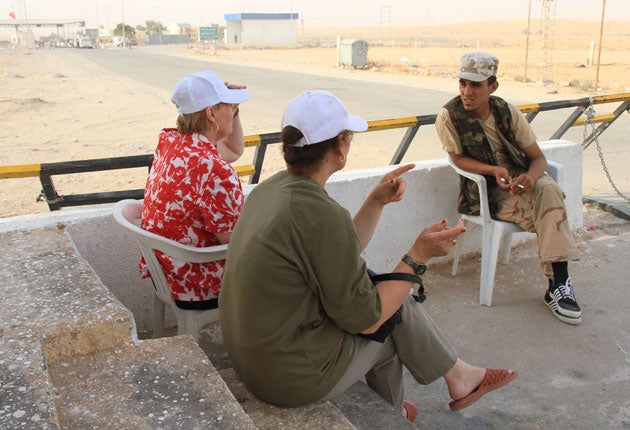'Paradise until the war': foreign medics tell of the Libya they lost
Lured from around the world, medical staff in the west have now been abandoned

Your support helps us to tell the story
From reproductive rights to climate change to Big Tech, The Independent is on the ground when the story is developing. Whether it's investigating the financials of Elon Musk's pro-Trump PAC or producing our latest documentary, 'The A Word', which shines a light on the American women fighting for reproductive rights, we know how important it is to parse out the facts from the messaging.
At such a critical moment in US history, we need reporters on the ground. Your donation allows us to keep sending journalists to speak to both sides of the story.
The Independent is trusted by Americans across the entire political spectrum. And unlike many other quality news outlets, we choose not to lock Americans out of our reporting and analysis with paywalls. We believe quality journalism should be available to everyone, paid for by those who can afford it.
Your support makes all the difference.In a hospital high in Libya's western mountains, doctors and nurses on their day off are clustered around a row of computers, speaking in Ukrainian, Korean and Bengali.
They came to Libya for the higher salaries and better life to be had in this oil-rich Arab state – but now they are trapped, their wages unpaid and Gaddafi's forces surrounding the road that leads to the safety of Tunisia in the east.
"It was a paradise until the war," sighed Tamara, one of the nurses working at the hospital in Nalut, in her dilapidated bungalow in the rows of staff accommodation in the hospital grounds. She came to Libya eight years ago from Transnistria, a quasi-state within Ukraine and one of the poorest places in Europe. She was happy here until rockets started falling, and the fear drove her 60-year-old husband mad.
Now she wants to leave but has not been paid since March and cannot go until she gets her wages, which were stopped when rebels took over the town early on in the Libyan revolution.
Inside the hospital, two Bangladeshi nurses stationed in the cavernous underground wards opened after the shelling began, told the same story. "They did not give us salaries for four months," said Shahanari Yasmin who arrived a year ago, lured by an advertisement in a Dhaka newspaper. She left a 12-year-old daughter and a nine-year-old son at home and now is unable to send them money.
Her colleague, Elizabeth, also from Dhaka, said that her mother is pleading with her to return home but she does not want to leave until she's been paid. "My father, my mother, everyone is sick. They need lots of medicine and I can't send them money to buy it."
Like all of the medical staff here, she sleeps in a bunker deep under the hospital, a measure taken after a rocket hit the hospital grounds a fortnight ago. "I'm too much afraid, heavy bombing," she said. "it's a very bad situation now".
Joyce, a 42-year-old nurse from the Philippines, is also fearful but does not want to risk travelling on the road to the border while it is still being shelled. "The fear is still with me," she said. "Gaddafi's forces are 10km from the border, any time they will attack."
Pushing a trolley of supplies down one of the hospital's subterranean corridors was Wilhelm Edgar Camer, a doctor from Bavaria, who is working with a British NGO helping at the hospital. He said that the work of the foreign medical staff was essential to keeping the hospital here open. "There are not sufficient Libyan doctors," he said. "At this hospital about 50 per cent are contracted from abroad, the mid to high-level staff are mostly foreign. Without them the hospital couldn't continue."
Hospital staff said that doctors and nurses working there came from North Korea, Ukraine, Bulgaria, Bangladesh and the Philippines. North Korean doctors paced around the wards and offices but refused to be interviewed.
The residents of most of the towns in Libya's remote western mountains fled to Tunisia or Tripoli when fighting first broke out in February. The patients at the hospital were mainly wounded fighters or civilian casualties of the nightly rocket attacks on this small Berber town. The staff treat both rebel fighters and the wounded Gaddafi soldiers they bring in.
They have little choice. "There are no staff anymore, all the Libyan nurses, they went to Tunisia", added Joyce as she prepared a trolley with drugs for wounded fighters. "If no foreigners stayed here, who will help them?"
Join our commenting forum
Join thought-provoking conversations, follow other Independent readers and see their replies
Comments